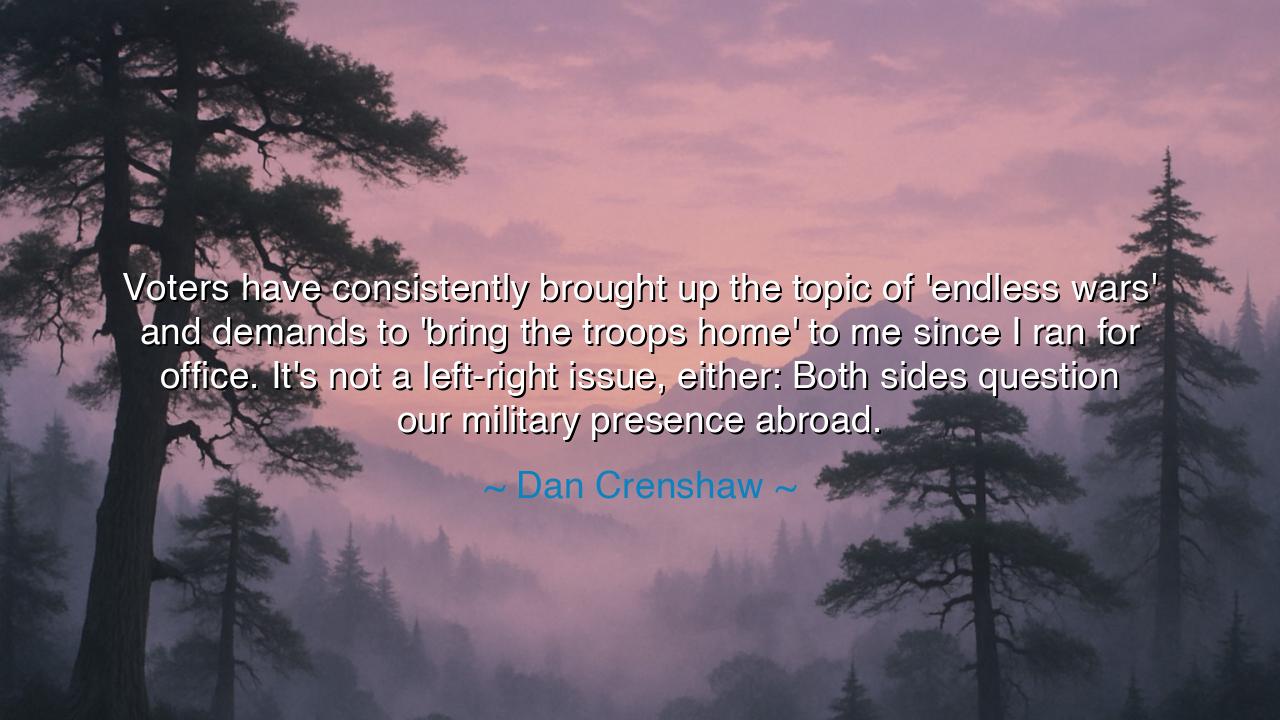
Voters have consistently brought up the topic of 'endless wars'
Voters have consistently brought up the topic of 'endless wars' and demands to 'bring the troops home' to me since I ran for office. It's not a left-right issue, either: Both sides question our military presence abroad.






In the councils of a restless republic, a voice like a bugle at dusk speaks plainly: “Voters have consistently brought up the topic of ‘endless wars’ and demands to ‘bring the troops home’ to me since I ran for office. It’s not a left-right issue, either: Both sides question our military presence abroad.” So says Dan Crenshaw, and in his words we hear an old tension made new—the yearning for safety joined to the cost of honor; the wearying march of campaigns far from hearth and field; the hope that courage might be shown without perpetual exile. The quote itself is on public record, a line gathered from his statements and interviews and preserved among his attributed sayings.
Attend to the architecture of the sentence. First comes the people—Voters—then the ache—endless wars—then the plea—bring the troops home. Only after these bells does the speaker name the unity of concern: not left-right, but neighbor to neighbor. Here lies the marrow: grief and prudence are not partisan organs; they beat in ordinary chests. The soldier’s absence is an empty chair at a kitchen table; the deployment becomes a calendar of late-night prayers. Thus the saying recalls us to the common—bread, beds, birthdays—and asks what measure of far-off struggle those things can bear before they bend.
Yet the proverb does not command; it observes. It tells us that the chorus has grown broad: Both sides ask the weather of our wars, and whether the storm yet serves the crops. The sentiment has found echo in recent acts of state—cross-aisle steps to re-evaluate old writs of war, to narrow the gates through which new ventures march. Such moves, debated and imperfect, nonetheless testify that the desire to examine our sword-hand now belongs to many banners, not one.
Consider a story fit for teaching. In a small town there lived a widow and a field medic—mother and son. He shipped out to deserts with names she mispronounced; she learned to count by rotations and homecomings. After years, the son returned whole but thin with sand; he spoke of villages where children practiced letters he had taught between patrols. When the town gathered at the hall to hear candidates speak, the mother did not ask for victory or surrender. She asked for clarity, and for an end that was an ending. The room—blue ties, red hats—nodded together like wheat under one wind. The lesson was simple: before ideology, there is a door that opens at midnight, and someone we love does or does not walk through it.
But the elders also warned against forgetting the world as it is. Tyrannies do not sleep because we wish to rest, and oceans are poor walls. Strategy is not a sin; prudence is not cowardice. The wisdom therefore is not to flee from the burden of defense, but to refuse the drift of habit—war as a season that never turns, commitment without definition, sacrifice without a horizon. Between naiveté and numbness, there is a narrow road called assessment, where aims are named, costs are counted, and exit is not a rumor.
History hums this chorus. Empires that mistook momentum for mission spent their sons like coin and came home poorer in spirit than in treasure. Republics that refused all vigilance paid in different coins—surprise, fire, and the sudden schooling of calamity. The art is to keep the sword sheathed in law and drawn only in necessity, then returned to its scabbard before the hand forgets how to unclench. Thus the quote’s heart: listen to the voters; question the endless; dignify the troops with purposes that fit a mortal life.
Let the counsel be plain. Ask always: What good do we seek, by what means, for how long, and with what measure of consent? Demand sunsets on authorizations, reviews that are honest rather than ceremonial, and missions that can be spoken without euphemism. Insist that care for veterans be budgeted as part of every drumbeat, not as an afterword. And teach your children the names of places where our flags have stood, so that debate is anchored in memory, not in slogans.
Actions, simple and sturdy: write your representatives with questions rather than accusations; read the texts that govern war powers before you inherit their consequences; show up—at hearings, at welcome-homes, at funerals—with a presence that outlasts the headline. Hold two truths: that peace is precious and must be defended, and that defense, to remain just, must be bounded. In this balance, the nation keeps faith with those who serve and with those who wait, and our common house becomes less a barracks and more a home.






AAdministratorAdministrator
Welcome, honored guests. Please leave a comment, we will respond soon